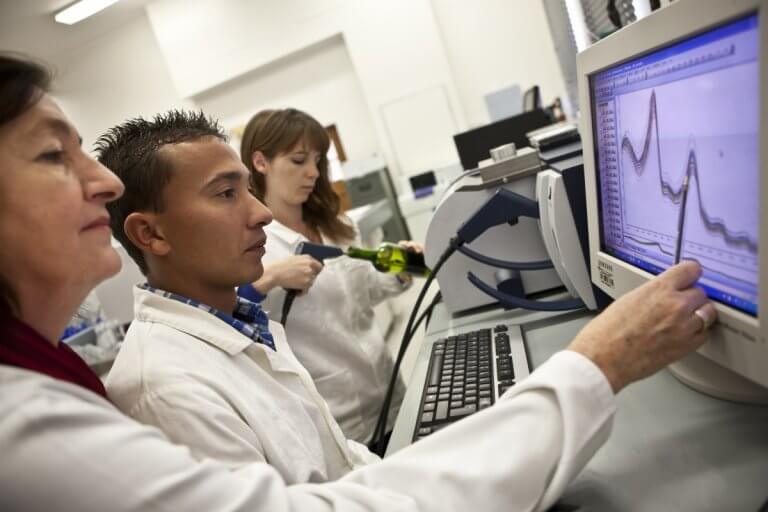
“The unpredictable and unstable future of wildlife and ecosystem services has driven me to educate myself in this field. I want to make a difference, contribute and try to ensure sustainable use and protection of wildlife and ecosystem services…so future generations will benefit from these natural wonders.” – James Robbins, BSc Conservation Ecology alumnus, Stellenbosch University
Home to 11 of the world’s fastest-growing countries, Africa has undoubtedly earned its name as the ‘Continent of the Future’. At the centre of this growth lies the agricultural sector; an industry that serves as the main source of income for 70 percent of the population, on top of being responsible for 40 percent of Africa’s GDP.
Even the experts collectively confirm the region as a hub for global development. It’s rural, it’s progressive, and it’s rapidly emerging as a popular choice for international agricultural studies.
As an institute dedicated to advancing agricultural activity in South Africa and beyond, the Faculty of AgriSciences at Stellenbosch University faced up the sizable development issues facing the contemporary world. From the production of quality food and natural fibres that are sustainable and affordable, to the contributions put toward improving rural areas, Stellenbosch has remained a pioneer of agricultural education for more than a century.

“If you have a degree in AgriSciences, you have a qualification with which you can compete on national and international levels,” the faculty explains. “You will be part of a group of experts who are highly sought-after in South Africa, Africa and the rest of the world.
“There is a range of challenging employment opportunities in the agricultural, forestry and conservation industries, ranging from the most practical to the highly technological…The success of our former students in the work environment is widely recognised, with several of our graduates accepting senior management positions early in their careers.”
Department of Animal Sciences
Founded in 1929, this is one of the oldest and most respected schools of its kind in the entire South Africa region. The department is acknowledged across the globe for its significant contribution to ground-breaking research, innovating the fields of animal nutrition, breeding, meat science and reproductive physiology. Harbouring an extensive portfolio of both undergraduate and postgraduate degrees, students here leave more confident, prepared and highly qualified.
Stellenbosch’s Animal Production Systems program functions as a four-year bachelor’s degree, resulting in a BSc Agriculture qualification in the field of Animal Science – encompassing the scientific study of the nutrition, breeding, physiology and the production of animals.

Here, students gain a strong knowledge base in animal physiology, monogastric and ruminant nutrition, animal breeding, production and product quality, ecology, biochemistry and the management of animal production systems.
The first year of study introduces eager learners to the fundamental subjects of Physics, Chemistry, Mathematics and Biology, setting the scene for the remainder of the four-year degree. Students graduating from the program will be prepared to work as consultants, entrepreneurs, technicians, agricultural extension officers, product development managers or production managers in animal science and related animal science fields. Species that are covered in the program include dairy and beef cattle, wool and mutton sheep, poultry, ostriches and wildlife, and freshwater and marine aquaculture species.
Department of Conservation Ecology and Entomology
Capitalising on a wealth of life-forms that surround its stunning campus, this department aims to address the world’s most pressing issues. From pollution, to climate change, to species extinction and every environmental problem you can find in between, the department strives to manage and conserve the biological diversity of land impacted by human activity.
“The world’s ecosystem services, resources and wildlife are under significant strain through indirect and direct anthropogenic utilisation and disturbances,” says James Robbins, former student of SU’s BSc in Conservation Ecology.

“The unpredictable and unstable future of wildlife and ecosystem services has driven me to educate myself in this field,” he explains. “I want to make a difference, contribute and try to ensure sustainable use and protection of wildlife and ecosystem services are maintained, so future generations will benefit from these natural wonders.”
This is an institution that’s as inspiring as it is academically sound. Set in the province of the Western Cape – a stunning World HHeritage site – AgriScience students relish a backdrop that’s bucolic and biodiverse. And as an institute that stands among the global Top 100 in the AgriScience field – as well as representing one of the continent’s Top 5 higher education providers – AgriSciences at Stellenbosch is a prime study choice.
Follow SU on Facebook, Twitter and YouTube
Liked this? Then you’ll love these…
Students love studying AgriSciences at Stellenbosch – here’s why you will too…
Bridging the skills gap: Universities that produce job-ready Agriculture graduates







